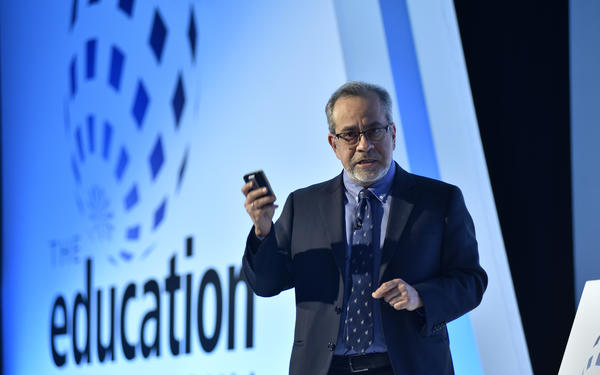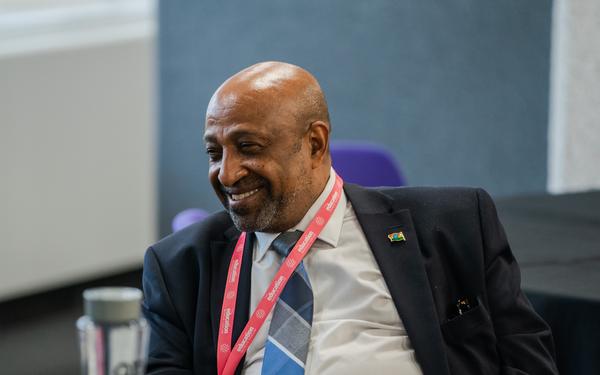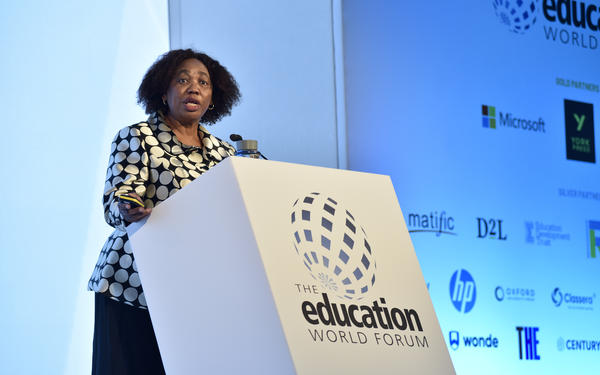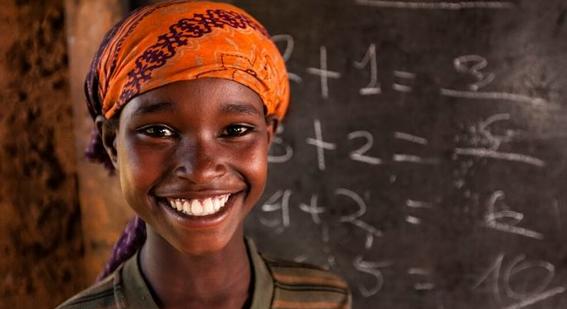Three takeaways from the Education World Forum 2023
This month, the Education World Forum returned to London. As the city buzzed around a coronation, 117 education and skills ministers from across the world and their delegations came together to discuss how we can create stronger education by design.

To improve education systems:
- Focus on the fundamentals,
- Use technology to empower people, not replace them,
Embrace the communications challenge.
Across the week, we had the pleasure of meeting delegates from around the world, both long-time friends and new faces. We discussed their immense challenges, but also impressive efforts to tackle learning loss and build forward since the last Forum.
On stage, the World Bank Group Education Practice Lead Jaime Saavedra set the scene of a huge and unequal global learning crisis, where “millions of children are not getting the foundational learning they need.” Ministers and experts shared different perspectives on tackling the crisis, and creating future-ready education systems. Three themes kept surfacing:
Focus on the fundamentals
Throughout this year’s Education World Forum, we heard Ministers and experts stress the importance of “going back to the fundamentals”, as Ethiopia’s Minister of Education, the Honourable Professor Berhanu Nega, put it.
This includes focussing on investing in foundational skills. Jaime Saavedra described seeing a shift from memorisation to comprehension, from dense and unrealistic curricula to useful and prioritised curricula, from a general approach to teaching at the level of the student. We need much more investment in these core areas.
The Honourable Dr Valentine Uwamariya emphasised how technology has created a more connected world, and so focusing on the fundamentals must include more emphasis on skills for collaboration and partnerships.
His Excellency Luvsantserengiin Enkh-Amagalan, Minister of Education & Science of Mongolia, said “We should not be preparing the young generation for grades and exams but for life – which demands a range of skills to respond to adversity.” Cambridge and the Ministry in Mongolia are working together on a roadmap of education transformation to deliver on this ambition through a focus on the fundamentals, including teacher training.
Andreas Schleicher, Director of Education & Skills, OECD, said ‘the best protection against automation is training people.”
Focusing on the fundamentals also includes investing in the core components of an education system: curriculum, assessment, teachers, teaching and learning resources, and ensuring they are aligned and resilient.
At the Forum, Emma Dorn, Education Senior Knowledge Expert at McKinsey, said that, though in recent years as many education systems around the world have declined as have improved, “The good news is, we know the what!” We know what the fundamentals are for a strong, resilient education system. The ‘how’, how to implement them, is then the challenge.
The Honourable Professor Nega shared how in Ethiopia they had made significant gains on access to education by 2015. However, they quickly realised that this was not translating into improving learning outcomes because access didn’t equal quality. He shared how “understanding the problems of the education system and doing something substantive about them” is paramount to move towards a well-functioning education system. In Ethiopia, this has included action on curriculum implementation, teacher development and community engagement so children are “actually learning, rather than achieving certificates.” Cambridge is supporting the curriculum reform strand of this journey.
System analysis is a powerful tool to understand your education system, and how and where to implement the most effective changes. At Cambridge, our approach to system analysis is underpinned by research which shows that in the most successful education systems, all the different aspects of the education system are aligned with one another and with the national education vision. This helps build system resilience – and making an education system prepared for a disaster in advance is vital.

Technology should empower educators, not replace them
AI and technology were on most people’s minds as we entered the Forum. With the pace of technological change accelerating, sessions were dedicated to the challenges and opportunities therein – but the conversation permeated almost every conversation. However, there was a clear consensus among delegates that technology should empower people, not replace them – especially when it comes to teachers.
Today, more students and teachers have technology at their fingertips than ever before.
- Honourable Fayval Williams, Minister of Education, Youth and Information for Jamaica.
Jaime Saavedra shared some of the opportunities and how “Covid showed us that technology will help us leverage teachers. It will do teacher training at scale. It will help enable more personalised learning in the classroom. It will help us manage the system better.”
His Excellency Nadiem Makarim shared how, in Indonesia, they have launched a teacher ‘super app’ to reduce some of the administrative burden for teachers and allow greater collaboration between teachers. Having listened to teachers, he said “teachers do not learn best from government, teachers learn best from teachers.”
Minister of Education for the UK, Gillian Keegan, spoke of the potential for AI software to mark homework and take on other ‘heavy lifting’ for teachers.
His Excellency Luvsantserengiin Enkh-Amagalan shared how, in Mongolia, technology has enabled teachers to reach 10,000 remote students through the country’s first digital school.
But, Jaime Saavedra then shared some of the risks posed…through technology, “there’s a huge risk that, though technology has huge potential to be an equalising factor, at the moment it’s the opposite as you must have skills to leverage technology.” He, and many others on stage, spoke to the importance of developing teacher pre-service and in-service training to ensure teachers have the skills to maximise use of technology, and pivot the classroom to the practice of learning rather than the conveyance of knowledge. This message of better supporting teachers, and their fundamental role in the education system, was echoed across the stage – especially by the Honourable Matsie Angie Motshekga, Minister of Basic Education, South Africa.

A communications challenge
Though there was consensus at the Forum about the urgency of the learning crisis, and the importance of focusing on the fundamentals and empowering educators, delegates were also concerned about a communication challenge ahead. Jaime Saavedra quoted that 80% of public officials around the world underestimate the severity of the learning crisis, and stressed it is not understood by all in society.
This is a central part of the implementation challenge when focusing on the fundamentals. Emma Dorn described how building a ‘coalition for change’ across your society “creates the space to unleash implementation excellence.” When His Excellency Nadiem Makarim recently visited Cambridge, he shared how important this has been in implementing change at huge scale and pace in Indonesia – but also how providing a compelling change narrative and getting parents, teachers, students and communities on board with a new approach will enable implementation to continue beyond a particular political term.
The Honourable Fayval Williams spoke about the importance of two-way communication between government and schools too, and in Jamaica this focus has supported school attendance returning to pre-Covid numbers.
And the communications challenge crosses borders. Freshta Karim, Founder and Director of Afghan NGO Charmaghz, returned to the Forum to call on Ministers and organisations to show solidarity with Afghan girls – who are still being denied their fundamental human right of an education. She recommended a joint statement calling for the reopening of girls’ schools across Afghanistan.
Communication is a huge challenge – communicating the magnitude of the [learning] crisis, communicating that there are solutions, communicating to people that they’re part of the solution. Money spent on communications is money well spent.
– Jaime Saavedra, Education Practice Lead, World Bank Group
Jaime Saavedra’s words were reminiscent of Sir David Attenborough’s call a few years ago that “saving our planet is now a communications challenge.”
We are on a journey of dialogue towards COP 28 in Dubai this December, one where the communications challenges of the climate and education crises will converge. Ahead of us are the 79th UN General Assembly, the meeting of education and technology ministers in Rwanda for the Innovation Africa Summit, and the RewirEd Summit. These are key opportunities to begin to tackle the communications challenge together, and it will be essential to build on this renewed focus on the fundamentals, and empowering people through technology. See you there!




